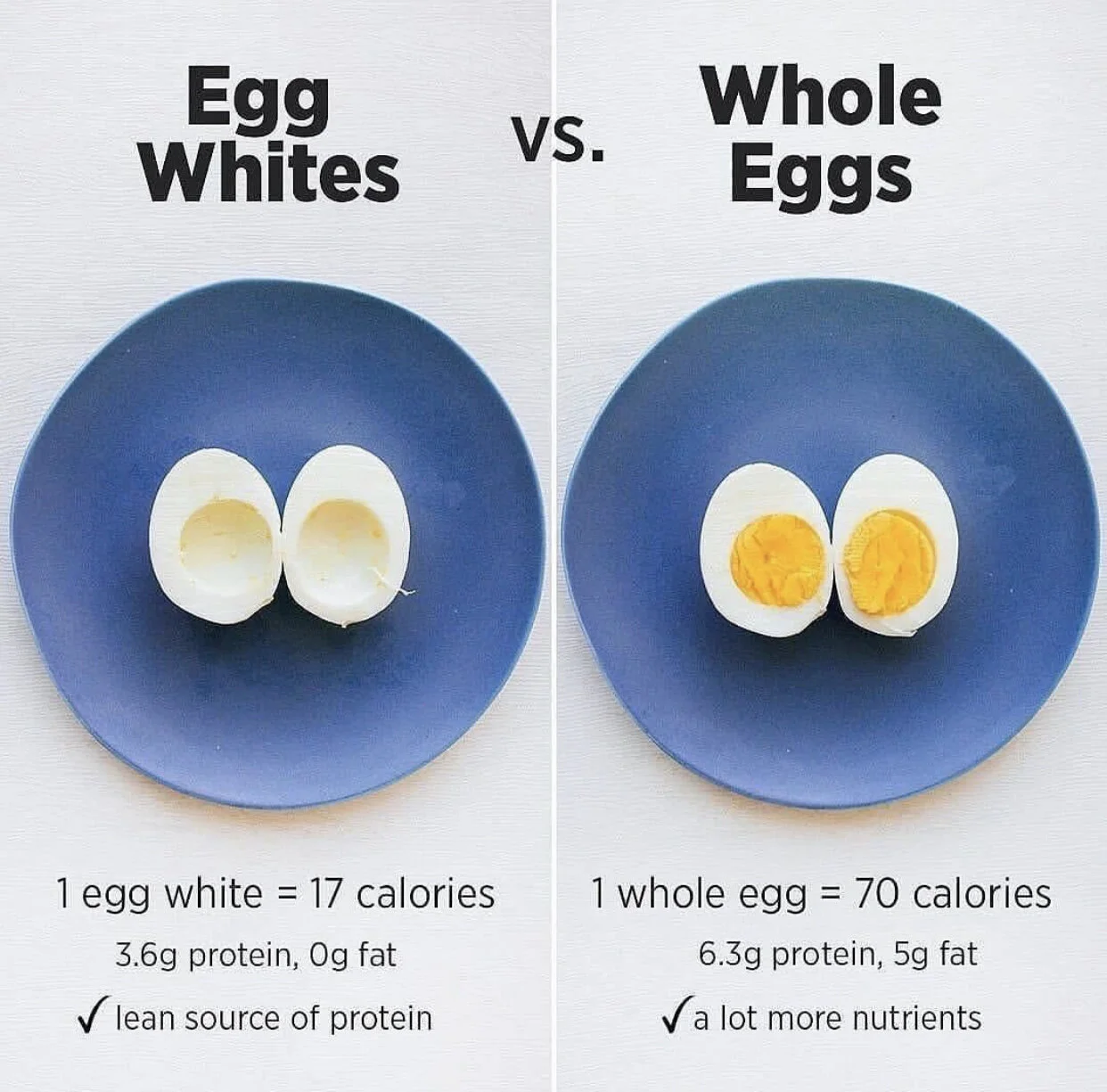Stop Counting Eggs!
Go ahead and crack that egg. Yes, you can have it. But there are caveats. Read on.
Eggs are an essential whole food frequently consumed by people across populations and cultures, which affordably support societies’ nutritional needs.
So what does an egg have in it?
One large egg (50 grams):
72 calories
5 grams of fat (30% saturated, 50% monounsaturated fat and 16% is polyunsaturated fat)
70 milligrams of sodium
6 grams of protein.
The yolk contains all the fat and cholesterol, most of the calories, nearly half of the protein, zinc, B vitamins (including riboflavin and folate), vitamin A, iron, carotenoids (lutein and zeaxanthin), choline, and other nutrients.
White egg or the brown egg?
“Designer” eggs contain more lutein, vitamin E, and omega-3 fats. They come from chickens fed special diets. But they rarely provide enough extra nutrients to be worth their higher cost. Eggs that claim to be rich in omega-3s, for example, contain only a small amount compared to fatty fish, such as salmon.
Brown eggs are not more nutritious than white. Different breeds lay eggs with different shell colors. For example, Orpington hens lay brown eggs, and Leghorns lay white ones. Some breeds even lay blue or green eggs.
Yolk color depends on what the chicken ate: wheat and barley produce a light yolk, corn a medium-yellow yolk, and marigold petals a deep yellow. Though not a sure indication, darker yolks may have more omega-3s and carotenoids.
Organic eggs come from the chickens fed an organic diet, not that they are necessarily more nutritious.
Little history
Eggs have long been singled out as food for restriction in human nutrition, although they are widely available, affordable, nutrient-dense, and a rich source of high-quality protein. In the past, dietary guidelines recommended an upper limit of egg intake (2 or 3 eggs/wk or less) to prevent CVD since eggs are a significant dietary cholesterol source. This recommendation to limit egg consumption was based on the observation that dietary cholesterol increases blood cholesterol and that blood cholesterol increases with CVD. In the 2015–2020 edition of the Dietary Guidelines for Americans, an earlier recommendation to limit dietary cholesterol consumption to 300 mg/d was withdrawn due to the lack of adequate evidence. Epidemiologic studies on egg consumption and the risk of CVD are sparse. Research in recent years has mostly exonerated eggs since it turns out that saturated fat in food, rather than dietary cholesterol, has a more significant effect on blood cholesterol and the related risk of heart attack and stroke.
Good or Bad?
The association between egg consumption and cardiovascular disease risk has been a topic of intense debate during the past decade. In the past year, three published studies have reported conflicting findings. Recent studies have reignited the discussion on this controversial topic.
Two extensive, recent observational studies add to the evidence that most people can safely enjoy eating eggs without fear of endangering their heart health. The egg industry did not fund these studies.
A study published in the American Journal of Clinical Nutrition analyzed data from about 177,000 people in 50 countries. It found that moderate consumption of eggs (up to an egg a day) was not associated with a higher risk of CVD, early death, or elevated blood cholesterol levels, even in people with a history of CVD or diabetes. This new study updates a 1999 one that likewise found no connection between eggs and heart disease risk.
A study published in the British Medical Journal in March 2020 looked at data from more than 215,000 health professionals for three decades, after adjusting for age, lifestyle, and dietary factors. The researchers found that moderate egg consumption (one egg daily) is not associated with cardiovascular disease—including CVD and stroke. This should help reassure uneasy egg eaters. Interestingly, the researchers also found some evidence suggesting that eating one egg daily may be associated with lower heart disease risk in Asian populations. It’s plausible that finding may be affected by the overall dietary habits of Asians.
Bottomline
You can have one egg daily without increasing the risk of cardiovascular disease, stroke, or early death. However, high‐risk individuals, such as those with high cholesterol and those already with high dietary cholesterol intake levels, should be careful. And yes, eating bacon and sausage with your daily egg will undoubtedly increase your risk. While not essential, moderate egg consumption can be part of a healthy diet. Stop counting eggs and move to healthier overall dietary patterns.
References:
Published 8/21/2020
Dr. Amar Singh, MD, and Dr. Poonam Singh, MD, are board-certified by the American Board of Internal Medicine and American Board of Obesity Medicine. They specialize in preventing, treating, and reversing chronic diseases using an evidence-based holistic approach. They are specifically interested in weight management, hormone re-balancing, and longevity. The American College of Physicians has recognized them as Fellows, FACP, for their excellence and contributions made to both medicine and the broader community. They enjoy teaching, volunteering, and advocating for their patients. Their mission is to share simple, effective, and proven strategies that lead to meaningful, sustainable, and long-lasting well-being.

